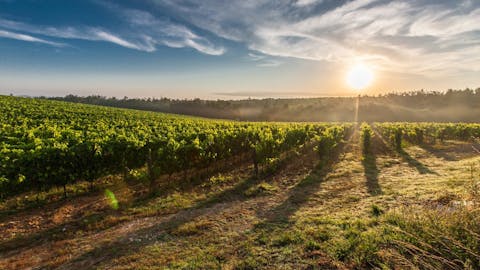Local Bounti Corporation (NYSE:LOCL) Q2 2025 Earnings Call Transcript August 13, 2025
Local Bounti Corporation beats earnings expectations. Reported EPS is $-0.00195, expectations were $-1.95.
Operator: Good morning, and welcome to Local Bounti’s Second Quarter 2025 Earnings Conference Call. [Operator Instructions] Please also note today’s event is being recorded. At this time, I’d like to turn the conference call over to Jeff Sonnek, Investor Relations at ICR. Please go ahead.
Jeff Sonnek: Thank you, and good morning. Today’s presentation will be hosted by Local Bounti’s Executive Chairman, Craig Hurlbert; and President, Chief Executive Officer and Chief Financial Officer, Kathleen Valiasek. The comments made during today’s call contain forward-looking statements within the meaning of the safe harbor provisions of the Private Securities Litigation Reform Act of 1995. All statements other than statements of historical facts are considered forward- looking statements. These statements are based on management’s current expectations and beliefs as well as a number of assumptions concerning future events. Such forward-looking statements are subject to known and unknown risks and uncertainties that could cause actual results to differ materially from the results discussed in the forward-looking statements.
Some of these risks and uncertainties are identified and discussed in the company’s filings with the SEC. We’ll also refer to certain non-GAAP financial measures today. Please refer to the press release, which can be found on our Investor Relations website, investors.localbounti.com, for reconciliations of non-GAAP financial measures to their most directly comparable GAAP measures. And with that, I would now like to turn the call over to Craig. Please go ahead.
Craig M. Hurlbert: Thank you, Jeff. And good morning, everyone. I want to start by again expressing my sincere gratitude to the entire Local Bounti team. I continue to be inspired by the dedication and commitment. I continue to witness across the company. It’s been truly remarkable as we execute on our strategic vision and build towards sustainable profitability. The confidence our strategic investors continue to show in Local Bounti’s vision and execution is evident in our recent $10 million capital infusion and commensurate debt reduction, strengthening our balance sheet at a critical inflection point. We’ve built a streamlined, focused organization with world-class talent, and Dane Almassy’s addition as our Chief Commercial Officer completes a commercial team capable of unlocking the full potential of our revolutionary Stack & Flow Technology, and the added capacity that’s coming online.
As we enter this next phase of growth, we believe that we have the right team, the right technology, and a significantly improved capital structure to capture the massive opportunity ahead in sustainable food production. With that, I’ll now turn the call over to Kathy.
Kathleen Valiasek: Thank you, Craig. Our entire organization remains fully aligned around disciplined execution on cost management and operational excellence. And I couldn’t be more proud of the collective effort of all of our employees during our progress towards sustainable profitability. Our second quarter results demonstrate the power of this disciplined approach. We delivered strong revenue growth while implementing strategic cost reduction initiatives that advance us on our path to positive adjusted EBITDA. Starting with our operational progress. I’m pleased to report that we successfully completed the strategic product mix recalibration of our Texas facility in late July, and the facility is now operating at full harvestable capacity as of early August.
The automated harvester installation is now complete and fully operational, replacing the temporary equipment we used during the second quarter, and we are already seeing immediate operational efficiencies with margin benefits expected to ramp throughout the remainder of the year. We’re continuing to make significant progress on yield improvement and cost reduction initiatives across our scaled facility network. Tower upgrades at our Georgia facility are expected to be completed in late August, with additional similar tower upgrades at our Texas and Washington facilities expected to be completed by the end of August and early September, respectively. These upgrades are designed to enhance production efficiency and increase yield capacity across our proprietary Stack & Flow Technology platform.
In terms of cost reduction, we have been extremely busy this year. Through the second quarter, we have actioned approximately $7 million of annualized cost savings across operating expense and cost of goods sold. I anticipate another $2.5 million to $3 million of annualized savings measures to be actioned in the second half of the year and more to come in 2026. These savings are also showing up across our entire operation. For instance, we are advancing our seed cost reduction program at our Texas and Washington facilities with the anticipated implementation expected throughout the third and fourth quarters of 2025. This program is designed to optimize seed costs and create greater efficiencies within our growing operations so that we are maximizing capacity at the lowest possible per unit cost, building on previous successful implementations at our Georgia facility.
Together, tower upgrades and seed cost reduction initiatives are expected to result in meaningful improvements in our facility level margins when fully completed. Further, we have identified additional opportunities across raw materials, packaging, utilities and other cost of goods sold that are already in action to help drive cost reductions through the second half of ’25 and into 2026. Turning now to our commercial progress. I’m excited about the addition of Dane Almassy as our Chief Commercial Officer. This appointment completes our commercial team and positions us well to unlock the full potential of our patented Stack & Flow Technology as we scale. Dane’s expertise and leadership will be instrumental as we execute on the significant opportunities ahead of us.

Our second quarter was marked by successful execution on key product launches and strategic initiatives. We successfully launched our new salad kit line in April, which has been well received by retail partners and represents an important expansion of our grab-and- go offering. This launch demonstrates our ability to innovate and respond to evolving consumer preferences for convenient, healthy options. Looking ahead to drivers for the second half of the year. We’re excited about our plans to launch a newer, larger, family-sized Caesar salad kit with a large multi-national retailer in the Pacific Northwest early in the fourth quarter. This represents part of a broader category expansion effort that will utilize our existing flavors and recipes to address the growing demand for family-sized convenience products at a great value.
We are also expanding our relationship with the leading home delivery service partner, launching four new private label salad kits in mid-September, bringing our total offerings with them to six. The velocity of customer engagement and the breadth of opportunities in our pipeline reflect the demand and unmet potential of CEA products in the market. Our retail partners are increasingly recognizing the value proposition of our technology and our ability to deliver consistent, high-quality products at scale. We continue to see strong momentum in our customer discussions with several significant opportunities progressing that could drive meaningful capacity utilization improvements in our Washington and Texas facilities as we move through the fourth quarter as well as a shift in mix, which will support improved gross margin.
Additionally, we’re seeing increased strategic collaboration from key partners who are helping us expand our retail footprint with major customers. And we’ve also gained critical insights from our retail partners that are helping us optimize our commercial approach and better serve their evolving needs. Turning now to our second quarter results. Our second quarter sales increased 28% to $12.1 million compared to $9.4 million in the prior year period. This growth was driven by increased production and growth in sales from our facility in Georgia and sales from our new facilities in Texas and Washington, partially offset by the Texas facility reconfiguration work that we completed in late July. Our adjusted gross margin percentage was approximately 30%, excluding depreciation and stock-based comp and other non-core items, compared to 29% in the prior year period.
Achieving a 30% adjusted gross margin represents a significant milestone for Local Bounti and reflects the highest quarterly adjusted gross margin we’ve delivered in recent quarters. This improvement demonstrates that our operational efficiency initiatives and product mix optimization are yielding tangible results. We expect that over time, our adjusted gross margin will increase as a percentage of sales, as a result of the continued scaling of the business and efforts to optimize production costs. Our Adjusted EBITDA loss improved to $6.5 million compared to a loss of $8.3 million in the prior year period and $8.8 million in the first quarter. This sequential improvement demonstrates the impact of our comprehensive cost reduction initiatives, which have already delivered approximately $7 million in annualized expense reductions during the first half of 2025 across operating expense and cost of goods sold.
To further illustrate the impact of our cost reduction initiatives, if we had been operating with the full run rate benefit of all the cost savings actions we’ve implemented, our second quarter expenses would have been lower by approximately $800,000, demonstrating the significant progress we’re making toward improving profitability. While this is illustrative and forward-looking, it does underscore the tangible impact these initiatives will have and our financial performance as they take full effect. As I mentioned earlier, we have also identified additional opportunities across our operations that we are already actioning in the second half of the year and into 2026, including raw materials, packaging, utilities and other cost of goods sold categories.
These initiatives are a direct result of our operational focus, resulting in significantly improved consistency across all facets of our growing operations. Turning now to our balance sheet. We ended the quarter with cash and cash equivalents and restricted cash of $13.2 million. I’m particularly pleased with the closing of an additional $10 million of financing through a convertible note payable with an existing strategic investor. Importantly, this was paired with an additional $10 million in debt reduction, meaningly simultaneously added capital while further reducing our debt. Later in August, we expect to close on an equipment leasing transaction where we expect to recoup approximately $2.3 million in cash. When you step back and look what we’ve accomplished from a capital structure perspective this year, the transformation has just been remarkable.
Starting with our March restructuring, where we brought in $25 million in new equity and resulted in the cancellation of approximately $197 million in debt principal and accrued interest, we fundamentally repositioned the company. This improved capital structure not only provides us with enhanced financial flexibility, but also validates our operational progress and strategic direction. Having committed strategic investors continue to invest alongside us as we execute our path to profitability speaks volumes about our business model and execution capabilities. Now for some comments on our outlook. We continue to expect our revenue run rate to ramp up later in the second half of 2025. We expect more modest sequential growth in the third quarter to accelerate into the fourth quarter.
This will be supported by a convergence of activity, including a greater contribution from the Texas facility transition, the additional capacity afforded by the Georgia facility yield improvement, additional gains at the Texas and Washington facilities stemming from greater productivity of our Stack phase following the tower upgrades that we completed, new product introductions and continued customer expansions. While our sales ramp has been influenced by the timing of our strategic retailer discussions, we nevertheless expect sequential improvements in our adjusted EBITDA loss rate in both the third and fourth quarters of 2025, driven by sales growth, cost reduction initiatives and the progression of margin benefits from our Georgia, Washington, and Texas facilities.
We continue to engage with strategic retailers to gain advanced visibility into their timelines and commercial ramp schedules. Based on these discussions, we now believe we can achieve positive adjusted EBITDA in early 2026 as we scale alongside retail deployment schedules to ensure sustainable, profitable growth. In conclusion, we’re energized by the progress we’re making across all areas of our business. While our team’s execution remains strong, our path to profitability is inherently tied to our retail partners’ timelines as we scale alongside their commercial schedules. We’re building the foundation for a high-growth, high-margin business by expanding door counts with new and existing customers and reliably serving them with safer, healthier, more sustainable products that customers enjoy.
We’re committed to positioning Local Bounti for durability, which will create lasting value for all of our stakeholders. With that, please open the call for Q&A.
Q&A Session
Follow Local Bounti Corporation (NYSE:LOCL)
Follow Local Bounti Corporation (NYSE:LOCL)
Receive real-time insider trading and news alerts
Operator: [Operator Instructions] Our first question comes from the line of Kristen Owen with Oppenheimer & Company.
Kristen Owen: Kathy, congratulations on all of the balance sheet work concluded again this quarter. I wanted to ask about the gross margin since you highlighted that. Now that we are through with the Texas reconfiguration, can you just help us understand how gross margin expands throughout the year? And is volume really the lever that we’re looking for here? Or are there any considerations to price or mix that we should be thinking about?
Kathleen Valiasek: Kristen, thanks for the great questions. Yes, there are several factors that are impacting the margin, the tower upgrades, right? There is absolutely a part of it to pricing and also product mix, okay? But there’s — it’s a little bit tough to pin down each of the factors kind of in a public forum. But — and there’s also all of the cost reductions, the raw material seed cost reduction, which are impactful also. Hopefully, that’s helpful.
Kristen Owen: Sure. I guess I’m thinking about how much of an uplift we should consider now that the Texas reconfiguration is complete. That might help us to at least pin down on some of the volume pieces of it.
Kathleen Valiasek: Yes. A little bit difficult to say how much it will increase over Q3 versus Q4. What we’ve pretty typically said that we hope to get in the range of 35% to 40% over time, probably not within the next quarter or 2, but it could get up to as much as 33%, 34%.
Kristen Owen: And then with the hiring of the new Chief Commercial Officer, just given where you stand with a lot of your large customers, what is your goal for that role going forward? Is it to expand with your existing customers? Open new store — new doors for you? Expand your retail presence with some of those partners? Just help us understand like what the priorities are from a commercial aspect over the next maybe 18 months.
Kathleen Valiasek: Yes, sure. Absolutely and thanks so much for that question. I just — I have to say, our commercial team, we have asked so much of them over the last 12 to 18 months, right? Last year, we more than doubled our capacity. We did not increase the head count at all, right, in the commercial team, and we asked them to sell out two new facilities, and they have done an absolute amazing job, right? We want to — just typically at Local Bounti, we believe in running lean, right? Staying focused and being strategic with how we build. Dane’s arrival reflects that mindset. He’s here, not to replace what’s working, but to amplify it. His leadership will bring added horse power to the already strong foundation that we’ve built.
But the biggest piece of what he’ll be working on is helping us to expand our strategic relationships with our customers because one of the things that I alluded to in my comments, our strategic investors are working with us to expand relationships with several of our large customers. So Dane will be heavily involved in that, and our existing team, therefore, can spend more time talking with the customers, which is what they love. So hopefully, that’s helpful.
Kristen Owen: That is. One last one for me, if I may. Just on anticipation of a Midwest facility. Are we still thinking about this in sort of the next 2- year horizon? And any update that you can provide there?
Kathleen Valiasek: Yes. Thank you for that question. I didn’t talk too much about — we didn’t talk too much about it even in the earnings release. Absolutely, those are some of the critical conversations that we are having right now. Midwest facility is absolutely still in the planning phases and also the expansions of our existing Georgia, Washington and Texas facilities. And those are all of the things that I’ve been spending quite a bit of time on, and Dane will be helping me with those conversations. Yes, absolutely, short term, we are on the books for those expansions in the Midwest.
Craig M. Hurlbert: Kristen, this is Craig. Just to kind of tag on to that. Our customer engagement is at an all-time high. And I think Kathy said it really well. Our commercial organization has done a great job. Dane’s addition, I think he’s going to be a great cultural fit. And he’s going to allow us to really tap into the pull that’s coming from the customers and the fact that these conversations for Local Bounti are at an all- time high. And I think it’s really going to allow us to kind of hit our stride commercially. So we’re all very excited for his arrival and candidly, blending in nicely with the amazing team we’ve already got.
Operator: Our next questions come from the line of Ben Klieve with Lake Street Capital Markets.
Benjamin David Klieve: First, I’m hoping you can elaborate a bit on the level of operations in the Texas facility. Kathy, you used the term, full harvestable capacity a few times. I’m wondering if you can talk about kind of what that term means, particularly in the context of the 6 acres under glass in Texas?
Kathleen Valiasek: Yes, sure. So Ben, thanks for the question. So Texas is a 6-acre facility, right? For half of the year, we’ve really only been garnering revenue from the cut side of the acreage, which is 3 acres. So now with the advent of the other 3 acres coming online, we can run — I think, one of the lines we were using in the first half of the year. But now, we’ll be able to run and harvest from all of the lines in those 3 acres, right? Both cut and living full-head product. So it’s basically like you’re kind of double — almost doubling the capacity out of that facility now.
Benjamin David Klieve: And then one more for me, just kind of a big picture philosophical question here. I mean regarding the engagement with retailers. So on one hand, there’s clearly a lot of progress with a lot of retail partners. Craig, you said that, that engagement is at an all-time high, or I forget exactly how you phrased it. But then at the same time, the kind of push out of the EBITDA target here seems to be driven by the retailer partners’ demand. Those demands seem to kind of — over the last several quarters, been consistently pushed to the right and never pulled forward. I’m wondering what gives you confidence here as you stand today in these conversations with retailers really delivering as expected because it’s been kind of 1 quarter after another, these retailer partners seem to be the kind of the challenge in the commercial ramp more so than your kind of overall level of capacity and kind of execution from a construction perspective.
Kathleen Valiasek: Yes, great question. Ben, so it’s really the coming online of the Texas facility, which is at this point, over this quarter, largely sold out and it’s just more customers coming into Washington. It’s just timing of the resets. We pushed out 1 quarter at this point, but at this point, over the next 90 days, we will be totally sold out in both of those facilities. So I hear you that it’s been pushed out a little bit. But at this point, our level of volumes that we are shipping annually is millions of pounds. The retailers see that by volume, we are the third largest CEA company in the country, and the retailers realize that, and that helps with decisions to come on board with us and to expand our — their SKU count with us.
Benjamin David Klieve: I look forward to the progress coming up here in the next quarter or 2 to come.
Operator: And ladies and gentlemen, at this time, I’m showing no further questions. I’d like to end the question-and-answer session and turn the conference call back over to management for any closing comments.
Kathleen Valiasek: Thank you, Darryl. I would like to thank everybody for joining us today, and we look forward to updating you on our progress as we further scale and grow Local Bounti’s business in the coming quarters. Thank you.
Operator: Ladies and gentlemen, this does conclude today’s conference call. We thank you for attending. You may now disconnect your lines.
Follow Local Bounti Corporation (NYSE:LOCL)
Follow Local Bounti Corporation (NYSE:LOCL)
Receive real-time insider trading and news alerts




